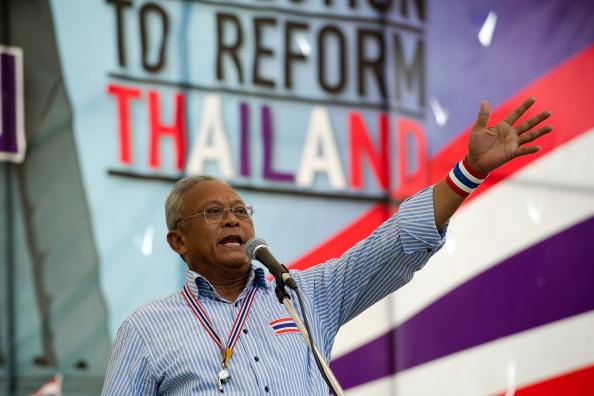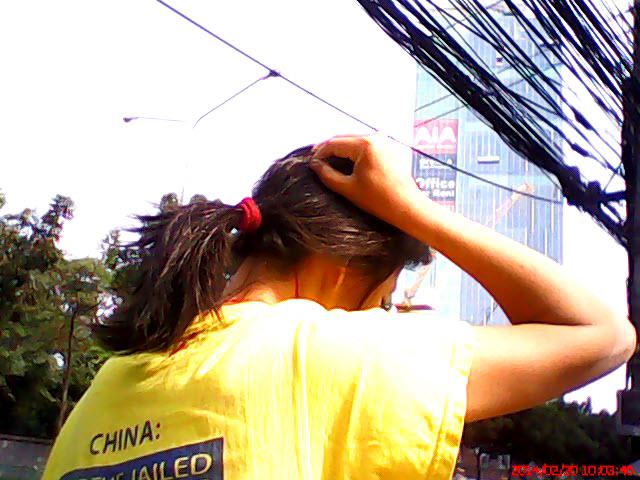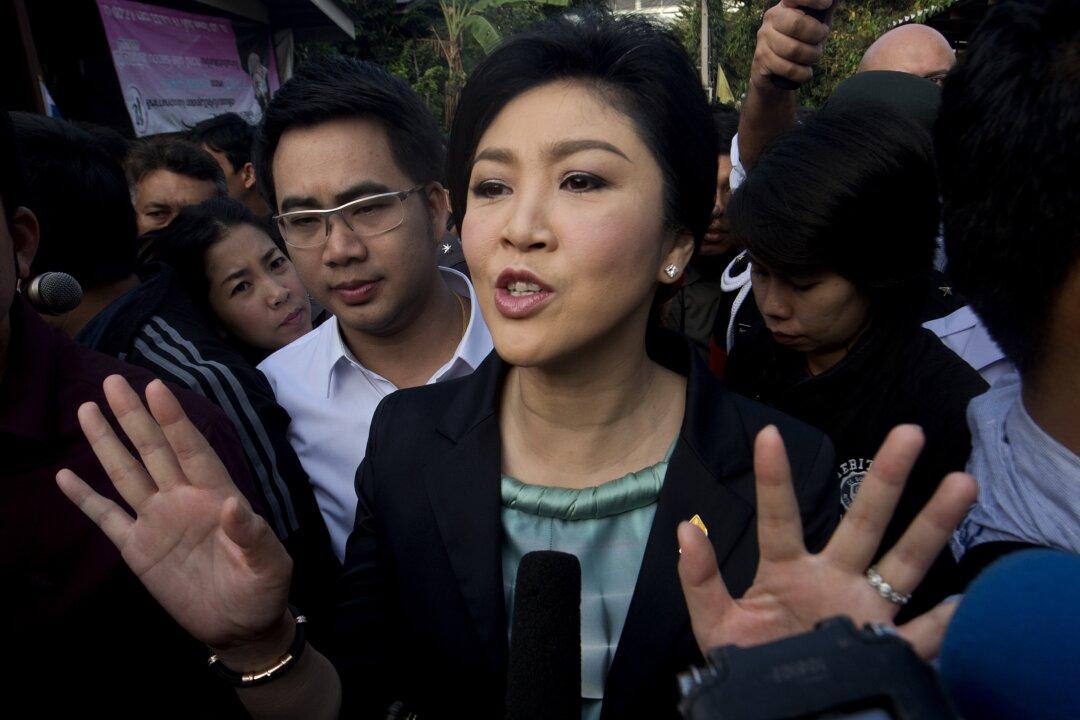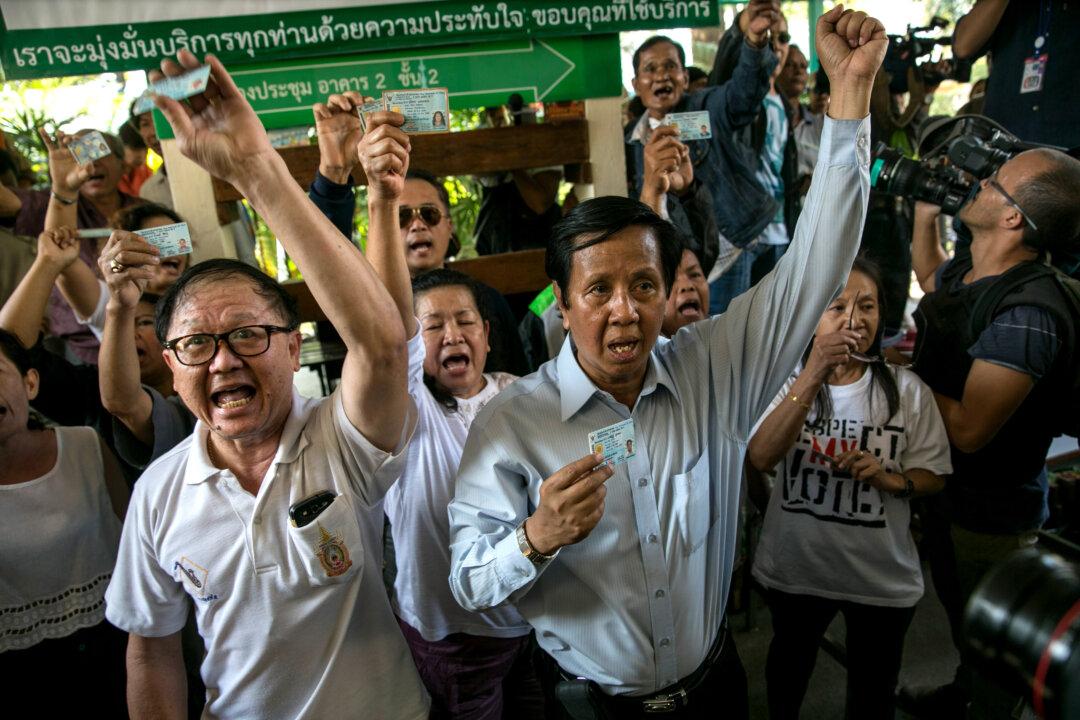BANGKOK—Lowly paid construction workers building another ritzy shopping mall in central Bangkok are easily seen from one of the elevated rail platforms of the Siam BTS Skytrain station.
The mall they’re working on replaces buildings damaged four years ago by red shirt protectors who held this area as part of their fortified encampment for eight weeks until they were forcibly removed by the Thai military.
Over 90 people were killed in related violence in the Thai capital that year (2010), mostly red shirts who support controversial ex-Prime Minister Thaksin Shinawatra, a corrupt billionaire tycoon who has lived in exile for years to avoid corruption charges.
As they work, the construction workers get scant attention from the commuters waiting opposite them on the platform for the next Skytrain. Most study smartphones or talk with friends, possibly about the effects of martial law curfew or how the army seized power last Friday in what is Thailand’s 12th successful military coup since 1932.
Led by Thailand’s top general, Prayuth Chan-ocha, the army did its putsch following increased political tensions between rival groups after Thaksin’s younger sister Yingluck Shinawatra was ousted from her position as prime minister by the country’s constitutional court.
The reasons for the coup, Gen. Prayuth said was to ensure peace and order.
Martial law permits the military to prohibit any activity, censor the media, search and seize any item, occupy areas, and detain people without charge for up to seven days, said Human Rights Watch.
The military has detained an unspecified numbers of politicians, journalist, and activists, mostly Thaksin supporters. Yingluck herself was detained for two nights and then released to go home Sunday, reported the Bangkok Post.
Despite the draconian powers granted to the military, many Bangkokians and people in the southern provinces support the coup just as they did the anti-Yingluck government rallies that occurred in the city for the past seven months.
“A coup may not be the greatest thing but it’s the best option at the moment,” said Rapeeparn a 35-year-old executive who works in the city. “Sure, it will have some effect to Thai’s economy but it will be nothing compared to letting Thaksin back to power!” she added.
The coup gained further credibility with its supporters when the military’s rule was formally endorsed by the country’s revered monarch, King Bhumibol Adulyadej on Monday.
Thaksin Factor
The current round of turmoil in Thailand’s nine-year-long crisis began in November with rallies against an amnesty bill put forward by Yingluck’s Puea Thai Party that would have allowed Thaksin to return to the country from exile.
The bill was quashed but rallies supported by ultra royalists, middle-class Bangkokians, and southerners shifted their focus to toppling Yingluck’s administration and ridding Thailand of the “corrupt Thaksin regime.” As these rallies continued nearly 30 people were killed in related violence.
A leader with a poor human rights record, Thaksin was Thailand’s prime minister from 2001 to the time he was ousted by an earlier military coup in September 2006. Although currently living in exile, Thaksin’s role in Thailand’s protracted political crisis can’t be overstated said commentators.
“Since 2001 he has been the single most influential person in Thailand, despite being physically absent from the country for half of that 13-year period,” said Benjamin Zawacki an independent analyst based in Bangkok.
“Thaksin’s involvement since 2006 has been determinative of Thai politics,” he said.
Via his proxies Thaksin was able to effectively run Thailand from early 2008 to late 2009 and again from mid-2011 through to last week’s coup via his sister, said Zawacki.
Thaksin and his sister are popular in Thailand’s north and northeast with poorer voters who benefited from his populist policies. These are also the areas where Thaksin’s red shirt supporters derive from, some of whom had previously warned they’d take up arms if the military ousted another elected Thaksin government.
Despite the coup, life in even pro-Thaksin areas in the north and northeast of the country largely continues as normal for the time being.
“It has really made little difference to Chiang Mai at all. Life goes on as normal. … It’s not very exciting,” said Colin Jarvis, a British communications consultant based in the northern city of Chiang Mai, the hometown of the recently ousted Yingluck.
“There were demonstrations a few nights ago [Saturday] where a few people were arrested but it was very mild which is a bit strange given it’s a strong Thaksin area,” he said.
Jarvis added that one of the biggest local concerns was the damaging effects that the political crisis was having on tourism in the area.
He added people were more privately worried about the ailing health of the country’s 86-year-old king and who will ultimately replace him on the throne, an extremely sensitive issue in Thailand.
Coup Problems
Analysts believe the coup won’t solve Thailand’s protracted political conflict but it will—like the previous coup in 2006—only increase the divisions that drive it.
“The coup risks making Thailand’s political crisis worse because it destroys Thai democracy and radicalizes pro-Thaksin forces to take up arms against the ruling military regime,” said Dr. Paul Chambers, a director of research at the Institute of Southeast Asian Affairs affiliated with Chiang Mai University.
“Thailand’s political polarization will now become more hardened than ever before: the military’s iron heel cannot heal the wounds a deeply divided land,” Chambers said.
“At the least, the red shirts and Puea Thai supporters will acquiesce in angry silence. As time goes on, there will be red shirt-led riots. At the worst, Thaksin will establish an informal government in exile and lead a low-intensity civil war with red shirts at the forefront.”
Within 24 hours of the military putsch, a small anti-coup demonstration was held in Bangkok’s retail center as witnessed by a multitude of foreign journalists. More protests were held over the weekend and have now become a daily event at Victory Monument, testing the army’s resolve in enforcing its martial law that bans gatherings or meetings of over five people together.
Meanwhile local papers publish reports about army raids outside of Bangkok that target hard-line militant elements of the Red Shirt Movement that they said are equipped with war weapons.



